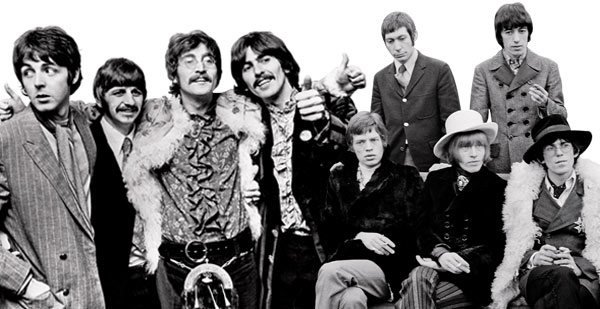
(Left) The Beatles in 1967 after the completion of Sgt. Pepper’s Lonely Hearts Club Band; (right) The Rolling Stones in 1967 in London’s Green Park
Related:
TOP 40 MUSIC ALBUMS BY CHICAGO ARTISTS »
We rank the 40 best albums ever by Chicago musicians
The Beatles or the Rolling Stones? The debate over which is the greater band has fueled arguments since both were recording Chuck Berry songs. This fall, Greg Kot and Jim DeRogatis, the hosts of Chicago Public Radio’s Sound Opinions, have upped the ante with a new book, The Beatles vs. the Rolling Stones: Sound Opinions on the Great Rock ‘n’ Roll Rivalry (Voyageur Press; $35), that compares the two groups side by side, examining drummers, managers, and more. DeRogatis won’t admit his loyalties, but Kot definitively puts himself in the Stones’ camp. “I loved the Beatles, but the Stones had that edge to everything they did,” says the Chicago Tribune critic. “There was a certain time when [singer Mick] Jagger was fairly consistently voicing contempt for what mainstream society was turning into, what was valuable, what it held dear, what kind of people it was turning out. I grew up in a blue-collar suburb of Syracuse where there was a cookie-cutter thing, thinking, There’s got to be more than this. Their attitude was very appealing.” We asked a few other prominent Chicagoans to weigh in—we hope you’ll weigh in, too, in the comments below.

“The Beatles have a deeper appreciation of all music. There’s a humor, there’s a Broadway sense, and later on, the Indian stuff came in. The Beatles were always taking in stuff and filtering stuff out to us. There’s such a classical sense of arrangement, and their harmonies—what the Beatles did vocally is amazing.” –Jimmy Vivino, music director and bandleader for Conan O’Brien’s new talk show on TBS. Vivino moonlights in the Beatles tribute band the Fab Faux. They perform on November 13th at the Vic Theatre; for info, etix.com.

“Once the Beatles realized they could do more in the studio, they didn’t compromise the quality of the music that was being written, but they went into the songs and created them inside themselves: double- tracking, multitracking, playing things backward, using orchestras in ways they’d never been used before. And on top of that you’ve got these amazing melodies.” –Chris Connelly, musician, novelist, and manager of Reckless Records in Wicker Park. Connelly reads from his novel Ed Royal on November 6th at Quimby’s; quimbys.com.

“If you asked me 25 years ago, I’d say the Rolling Stones, but today I’ll take the Beatles. I guess I’m more laid back. In my old days I can relax and listen to the Beatles. It feels good. The songs are great songs.” –Joel Quenneville, head coach of the Chicago Blackhawks

“The songs are beautifully crafted and complex. There’s a lot of nuance there. Paul [McCartney] was one of the greatest bass players of all time. He would put the bass on after everything else was finished, and it shows. The bass lines are so melodic, and they bounce off the other stuff.” –Rob Kassinger, double bass with the Chicago Symphony Orchestra. For a list of November performances, visit cso.org.

“In terms of sheer beauty and incredible innovativeness, some of the most beautiful rock ’n’ roll songs that have been written have been by the Beatles, and they would try anything. Some of the keys they were playing in were outrageous. They are phenomenal poets. The closest writing teams we have to look at were Lerner and Loewe and Rodgers and Hammerstein. Lennon and McCartney were of that caliber.” –Mark Delavan, baritone, who portrays Renato in Verdi’s The Masked Ball at the Lyric Opera, beginning November 15th; lyricopera.org

“I’m a big fan of both bands, but the Stones now captivate me a lot more. I keep finding things, the details of the inflection of the voice or the guitar parts, and get a fresh enjoyment of it. Keith Richards’s rhythm guitar is fantastic. The open tunings are just magnificent. I also love Mick Jagger’s gift for delivering lyrics. Every single syllable has such conviction.” –Steven Rings, assistant professor of music at the University of Chicago, who is teaching a course this fall on the analysis of song cycles, including works by Schubert, Schoenberg, and Bob Dylan

“My more intellectual side likes the Beatles’ delicacy and complexity, but the Stones’ raw, raunchy, raucous, dark aspect sets them apart for me. It’s appreciating somebody else going to those deeper, darker places so I don’t have to do it myself.” –Michael Darling, chief curator of the Museum of Contemporary Art. Contemporary art with a side of teen spirit? Darling curated Kurt, an exhibition of artists influenced by Kurt Cobain, at the Seattle Art Museum earlier this year.

“I don’t think the Stones match the number of purely great songs as the Beatles, even though they have been around for so much longer, but I prefer the Stones’ great songs. I like the dirt and the menace and the drums and bass underbelly in Stones songs.” –Ronan Marra, writer and director of Aftermath, opening November 6th at Signal Ensemble Theatre; signalensemble.com. Marra has written Aftermath, a jukebox musical about the late Rolling Stones guitarist Brian Jones, who died mysteriously in 1969.

“The Rolling Stones are like riesling—razor sharp and with great longevity. The Beatles are like merlot, kind of easygoing, soft, and palatable, but they don’t have the hard edges of the Rolling Stones. I don’t get the visceral goose bumps from the Beatles that I get from the Rolling Stones.” –Alpana Singh, director of wine and spirits for Lettuce Entertain You Enterprises and host of Check, Please! on WTTW. Singh joins a panel discussion titled “The Perfect Meal,” part of the Chicago Humanities Festival, November 14th; chicagohumanities.org.
Photography: (Beatles) John Pratt/Stringer/Hulton Archive; (Stones) ©Michael Ochs Archives/Corbis


